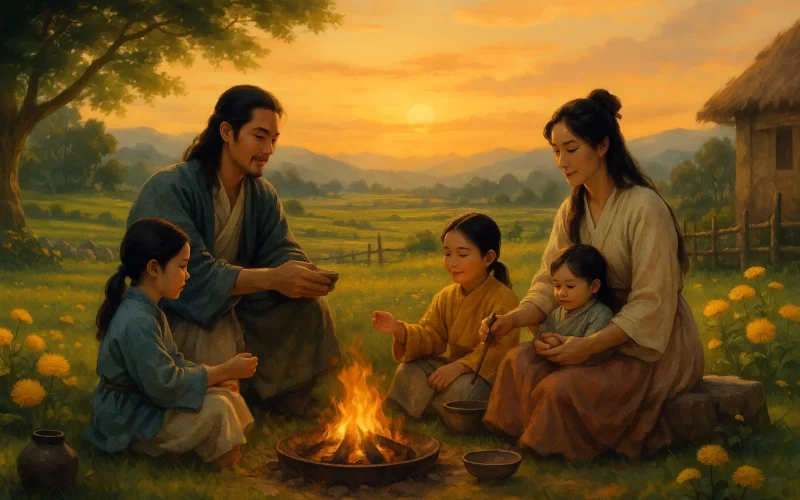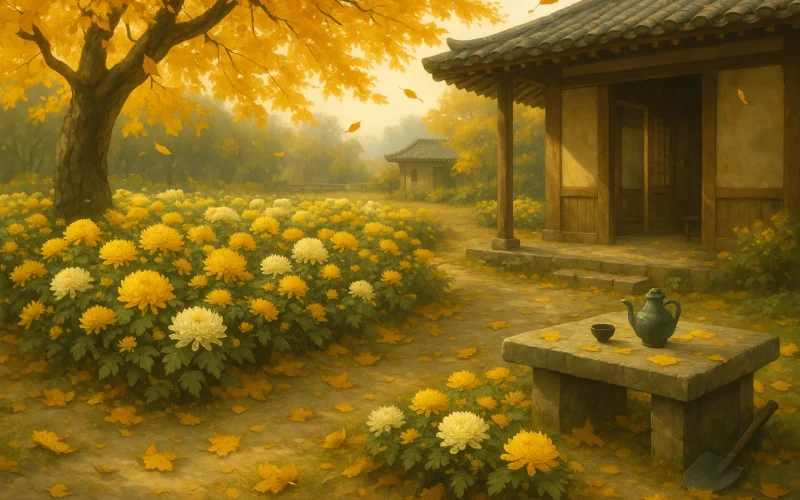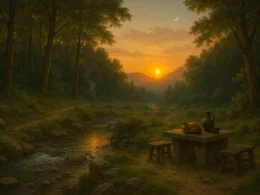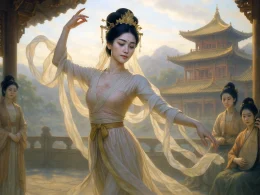Let me go home!
Oh, why should I still roam
While my fields will be overgrown with weed,
why don't I go where there is need?
Since I allowed my body to be master of my mind,
Why should my service be considered as unkind?
Let the bygone days be bygone!
The future's still my own.
I've not gone far astray,
Now that I know I was wrong yesterday.
My boat and ripples sway;
My robe flaps with breeze light.
I ask my homeward way,
And wait to see twilight.
Seeing my cot with glee,
I'm afraid to be late.
My household welcomes me
With children at the gate.
The paths look like wasteland
But for chrysanthemum and pine.
I enter, holding my youngest son's hand,
And see my cup brimming with wine.
I freely drink unoccupied
And gaze with smile at courtyard trees.
Standing by the window with pride,
In narrow rooms I feel at ease.
I walk in my garden with pleasure;
The gate is closed without a bar.
Wandering, staff in hand, at leisure,
I look upward and afar.
Carefree clouds leave the mountain crest,
Tired birds fly back towards their nest.
The sun is dimmed on its decline
And I caress a lonely pine.
I'm now at home,
In mundane world I'll no more roam.
Since social life and I cannot agree,
What can I seek to do if I want to be free?
Talking with kins will bring me pleasure;
Reading and playing lute beguile my leisure.
I'm told by farmers of the coming of season best
For me to till the field in the west.
I drive a cart
Or row a boat.
To go across rugged hills I start,
Or on a winding stream I float.
With joy all flowers blow;
Slowly streams glide from fountains clear.
In time all the things move and grow;
To the end my life's drawing near.
So let it be!
How long on earth can I do what I please?
Why not set my mind free?
Where should I go?
Why ill at ease?
I do not aspire to wealth or renown,
Nor go up to celestial spheres.
I only wish to wander on my own
Or leave my staff to till the field where weed appears.
I'll go up eastern hill to sing
Or croon a verse by limpid stream.
I'll return to the source of spring
And vanish with sunshine or moonbeam.
Original Poem
「归去来兮辞」
陶渊明
归去来兮,田园将芜胡不归?
既自以心为形役,奚惆怅而独悲!
悟以往之不谏,知来者之可追。
实迷途其未远,觉今是而昨非。
舟遥遥以轻飏,风飘飘而吹衣。
问征夫以前路,恨晨光之熹微。
乃瞻衡宇,载欣载奔。
僮仆欢迎,稚子候门。
三径就荒,松菊犹存。
携幼入室,有酒盈樽。
引壶觞以自酌,眄庭柯以怡颜。
倚南窗以寄傲,审容膝之易安。
园日涉以成趣,门虽设而常关。
策扶老以流憩,时矫首而遐观。
云无心以出岫,鸟倦飞而知还。
景翳翳以将入,抚孤松而盘桓。
归去来兮,请息交以绝游。
世与我而相违,复驾言兮焉求?
悦亲戚之情话,乐琴书以消忧。
农人告余以春及,将有事于西畴。
或命巾车,或棹孤舟。
既窈窕以寻壑,亦崎岖而经丘。
木欣欣以向荣,泉涓涓而始流。
善万物之得时,感吾生之行休。
已矣乎,寓形宇内复几时?
曷不委心任去留?
胡为乎遑遑欲何之?
富贵非吾愿,帝乡不可期。
怀良辰以孤往,或植杖而耘耔。
登东皋以舒啸,临清流而赋诗。
聊乘化以归尽,乐夫天命复奚疑!
Interpretation
This poem was composed in 405 CE when Tao Yuanming was 41 years old, at a crucial turning point in his life. Having begun his official career at 29, he served for 13 years but constantly felt constrained and dissatisfied. His last post was as Magistrate of Pengze, which he resigned after merely 80 days, refusing to "bow for the sake of five pecks of rice." After returning home, he wrote this "Returning Home" rhapsody to express his enlightenment about life, rejection of officialdom, and joyful return to nature. This work stands as his declaration of resignation and rural return, the fullest expression of his lifelong philosophy, and the most representative literary work of seclusion in Chinese history.
First Section: "归去来兮,田园将芜胡不归?既自以心为形役,奚惆怅而独悲!悟以往之不谏,知来者之可追。实迷途其未远,觉今是而昨非。"
Guī qù lái xī, tiányuán jiāng wú hú bù guī? Jì zì yǐ xīn wéi xíng yì, xī chóuchàng ér dú bēi! Wù yǐwǎng zhī bù jiàn, zhī láizhě zhī kě zhuī. Shí mítú qí wèi yuǎn, jué jīn shì ér zuó fēi.
Homeward I go! My fields and gardens will be overgrown—why not return? Since making my mind a slave to my body, why these gloomy looks and lonely despair? I recognize past mistakes cannot be undone, but know future courses may yet be pursued. Truly I strayed not far from the path, now seeing today's right and yesterday's wrong.
This opening section establishes the central theme with the exclamation "Homeward I go!" The poet directly states his intention to return, revealing profound weariness of official life and yearning for rural simplicity. The line "making my mind a slave to my body" reflects his realization of past suffering under worldly ambitions. "Seeing today's right and yesterday's wrong" marks his spiritual transformation from regret to awakening. Comparing officialdom to a wrong path, he rejoices at turning back before going too far, demonstrating deep self-reflection and enlightenment. The vivid imagery of sailing and fluttering sleeves conveys his emotional urgency, while "asking travelers about the road, regretting the faint dawn light" reveals restless eagerness to return home. This section flows with poetic sincerity as a declaration of inner awakening.
Second Section: "乃瞻衡宇,载欣载奔。僮仆欢迎,稚子候门。三径就荒,松菊犹存。携幼入室,有酒盈樽。引壶觞以自酌,眄庭柯以怡颜。倚南窗以寄傲,审容膝之易安。园日涉以成趣,门虽设而常关。策扶老以流憩,时矫首而遐观。云无心以出岫,鸟倦飞而知还。景翳翳以将入,抚孤松而盘桓。"
Nǎi zhān héng yǔ, zài xīn zài bēn. Tóngpú huānyíng, zhìzǐ hòu mén. Sān jìng jiù huāng, sōng jú yóu cún. Xié yòu rù shì, yǒu jiǔ yíng zūn. Yǐn húshāng yǐ zì zhuó, miǎn tíng kē yǐ yí yán. Yǐ nán chuāng yǐ jì ào, shěn róngxī zhī yì ān. Yuán rì shè yǐ chéng qù, mén suī shè ér cháng guān. Cè fúlǎo yǐ liú qì, shí jiǎoshǒu ér xiá guān. Yún wúxīn yǐ chū xiù, niǎo juàn fēi ér zhī huán. Jǐng yìyì yǐ jiāng rù, fǔ gū sōng ér pánhuán.
Now I glimpse my thatched roof—joyfully I hurry forward. Servants greet me, children wait at the gate. Garden paths grow wild, yet pines and chrysanthemums remain. Leading children indoors, I find wine fills the jars. Pouring my own cup, I smile at courtyard trees. Leaning by south windows, I indulge my pride; seeing my cramped quarters brings ease. Daily garden walks become delights; though gates exist, they stay always closed. Staff in hand, I wander and rest, sometimes gazing afar. Clouds drift aimless from peaks; birds fly home when weary. Sunlight fades toward dusk; I linger stroking a lone pine.
This section vividly depicts homecoming scenes. The poet's joyful sprint upon seeing his home reveals genuine emotion. "Servants greet me, children wait" paints a warm family picture contrasting with rural tranquility. Surviving pines and chrysanthemums symbolize enduring noble ideals. Drinking alone while admiring courtyard trees shows self-contentment. "Daily garden walks become delights" elevates mundane routines into refined pleasures. "Clouds drift aimless…birds fly home" uses nature's cycles to mirror his return. The concluding image of caressing a pine at dusk reflects both nature appreciation and life contemplation, showcasing spiritual solace and self-acceptance found in rural life.
Third Section: "归去来兮,请息交以绝游。世与我而相违,复驾言兮焉求?悦亲戚之情话,乐琴书以消忧。农人告余以春及,将有事于西畴。或命巾车,或棹孤舟。既窈窕以寻壑,亦崎岖而经丘。木欣欣以向荣,泉涓涓而始流。善万物之得时,感吾生之行休。"
Guī qù lái xī, qǐng xī jiāo yǐ jué yóu. Shì yǔ wǒ ér xiāng wéi, fù jià yán xī yān qiú? Yuè qīnqi zhī qínghuà, lè qín shū yǐ xiāo yōu. Nóngrén gào yú yǐ chūn jí, jiāng yǒushì yú xī chóu. Huò mìng jīn chē, huò zhào gū zhōu. Jì yǎotiǎo yǐ xún hè, yì qíqū ér jīng qiū. Mù xīnxīn yǐ xiàng róng, quán juānjuān ér shǐ liú. Shàn wànwù zhī dé shí, gǎn wú shēng zhī xíng xiū.
Homeward I go! Let me sever worldly ties. The world rejects me—what more could I seek? I delight in family conversations, rejoice in zither and books to dispel cares. Farmers tell me spring has come; work calls in western fields. Sometimes I take a covered cart, sometimes row a lonely boat. Exploring deep ravines, crossing rugged hills. Trees flourish with new life; springs gurgle fresh streams. I admire how all things thrive in season, while sensing my own life's approaching end.
Here the poet reaffirms his break with society and love for nature and family. "Delight in family conversations…zither and books" shows spiritual fulfillment beyond worldly bonds. "Covered cart…lonely boat" depicts leisurely freedom. Contrasting spring's vitality ("trees flourish…springs gurgle") with his mortality reveals poignant reflections on time's passage. Plain language elevates into philosophical transcendence, expressing rural life's quiet profundity.
Fourth Section: "已矣乎,寓形宇内复几时?曷不委心任去留?胡为乎遑遑欲何之?富贵非吾愿,帝乡不可期。怀良辰以孤往,或植杖而耘耔。登东皋以舒啸,临清流而赋诗。聊乘化以归尽,乐夫天命复奚疑!"
Yǐ yǐ hū, yù xíng yǔnèi fù jǐ shí? Hé bù wěi xīn rèn qù liú? Hú wéi hū huánghuáng yù hé zhī? Fùguì fēi wú yuàn, dì xiāng bùkě qī. Huái liángchén yǐ gū wǎng, huò zhí zhàng ér yún zǐ. Dēng dōng gāo yǐ shū xiào, lín qīng liú ér fù shī. Liáo chéng huà yǐ guī jìn, lè fū tiānmìng fù xī yí!
Enough! How long can this body dwell in creation? Why not follow the heart's desires? Why rush about seeking what? Wealth and rank I never wanted; immortal realms cannot be reached. Cherishing fine days, I wander alone—sometimes planting my staff to weed and hoe. Climbing eastern banks, I sing aloud; facing clear streams, I compose poems. Thus I ride change to my journey's end, rejoicing in Heaven's will without doubt!
The final section contemplates life's brevity and fate's acceptance. "Enough! How long…" questions life's transience while rejecting both worldly success ("wealth and rank") and religious escapism ("immortal realms"). "Climbing eastern banks…compose poems" epitomizes his ideal life, merging with nature. The conclusion—"ride change to my journey's end"—shows serene acceptance of mortality, embodying harmonious wisdom with nature.
Holistic Appreciation
"Home-Going-and-Coming Song" crystallizes Tao Yuanming's spiritual awakening and physical withdrawal from officialdom. Progressing from enlightenment to philosophical transcendence, it blends sober reflection with elevated insight. The poet's limpid brushwork paints rural life's tranquil beauty while expressing submission to natural law and life's essence. Containing both solemn declarations ("wealth and rank I never wanted") and vibrant nature imagery ("trees flourish with new life"), its意境 (yìjìng, artistic conception) balances serenity and richness. This sincere, natural emotional expression represents the pinnacle of literati reclusion literature.
Artistic Merits
Though categorized as a rhapsody (辞赋 cífù), the work innovatively blends prose and verse for fluid yet rhythmic language. While plainly stating convictions, it also employs exquisite poetic imagery like "clouds drift aimless from peaks; birds fly home when weary"—using natural phenomena to symbolize mental states through情景交融 (qíngjǐng jiāoróng, emotion-scene fusion).
The writing balances rationality and sensibility. The first half emphasizes introspection and ideological elevation, revealing deep reflection on bureaucracy and life; the latter half uses life scenes and natural tableaux to portray rural serenity. From remorse to reclusion, resignation to homecoming, object contemplation to landscape appreciation, the poet's structural progression unfolds his intellectual journey and life philosophy.
Moreover, Tao masterfully uses characteristic actions to enhance emotion: "joyfully I hurry forward," "leading children indoors, wine fills the jars." These craft an authentic, simple persona while conveying inner peace and joy, creating immersive sincerity.
Insights
This rhapsody conveys not just rural longing but profound philosophy of "following nature" and "obeying one's heart." Tao's personal choice teaches us: even amid fame and fortune, keep an untainted spiritual sanctuary; though entangled, find courage to return to one's true path.
His attitude—"content yet humble, transcendent yet unarrogant"—faces life's vicissitudes with detachment and carries existence's weight with tranquility. His sought-after "contentment in poverty" isn't passive escape but active pursuit of authenticity.
For modern readers, Tao's reclusion means not geographical "return" but spiritual "homecoming." In our complex society, we equally need clarity and resolve to distinguish true aspirations from vain pursuits, preserving inner peace amid chaos while remembering our original direction.
Poem translator
Xu Yuanchong (许渊冲)
About the poet

Tao Yuanming(陶渊明), 365 – 427 CE, was a poet, literary figure, fu writer, and essayist active during the late Eastern Jin and early Liu Song dynasties. Born in Chaisang (near present-day Jiujiang, Jiangxi Province), he pioneered a new genre of pastoral-themed literature, expressing profound philosophical insights through simple language. His poetic style became an enduring aesthetic standard in classical Chinese poetry.











